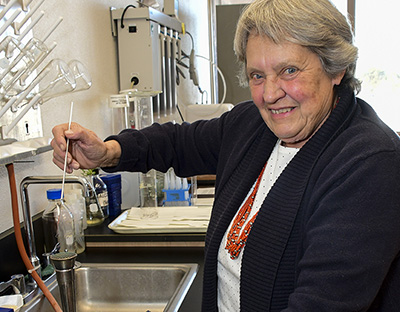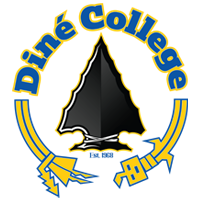 FOR IMMEDIATE RELEASE
FOR IMMEDIATE RELEASE
January 28, 2019
Instructor: ‘Antibiotic Resistance is a very serious problem facing the world’
TSAILE, Ariz. — Diné College is joining the push to mitigate one of the most critical public health crisis facing the world: antibiotic resistance.
Professors Barbara Klein, M.S., and Shazia Tabassum Hakim, Ph.D., science faculty at Diné College, recently took part in a week-long seminar at the University of Wisconsin related to the Tiny Earth initiative.
The program was founded in 2018 by University of Wisconsin professor Jo Handelsman and with a two-fold mission: to encourage students to pursue careers in science through real-world applicable laboratory and field research in introductory courses, and to address a worldwide health threat — the diminishing supply of effective antibiotics by tapping into the collective power of student researchers, at the same time tackling the same challenge, living up to Tiny Earth’s motto, “student sourcing antibiotic discovery.”
Tiny Earth is a network of instructors and students focused on crowdsourcing antibiotic discovery from soil.
Klein and Hakim are microbiology instructors at Diné College. Klein works at the Tsaile campus and Hakim at Diné College’s Tuba City campus.
“The program introduced us to a research project that will engage the students in authentic research,” Klein explained. “The students will be scientists contributing to the answer to one of the most challenging problems facing humans. The research project could be substituted for lab activities in microbiology classes. Antibiotics resistance is a very serious problem facing the world.”
Tiny Earth leverages a network of partner institutions whereby instructors learn the curriculum and integrate the research protocols in lab-based courses at universities, colleges and high schools. Tiny Earth’s student scientists, many of them experiencing the scientific method in action for the first time, hunt for novel antibiotic organisms in soil samples. It’s a global and growing network in 2019, Klein and Hakim explained: The program is adding 22 new partner institutions this year. The community of instructors now encompasses 15 countries and 45 U.S. states.
“Twenty-seven of us were trained in the lab techniques and we also spent time conversing with our peers on how to best incorporate the methods and how to address possible obstacles and limitations,” Hakim said. “The project could be expanded and serve as a summer research project.”
Instructors from educational institutions across the United States attended the intensive five-day training at the Wisconsin Institute for Discovery in UW’s Madison’s Discovery Building. The new instructors are part of Tiny Earth’s commitment to engage schools, departments, colleges, and aspiring scientists across the globe, Klein and Hakim said.
The program, headquartered at UW-Madison’s Wisconsin Institute for Discovery, is more than just a course: A network of talented students and instructors share research findings, best practices and enthusiasm for discovery.
The name Tiny Earth reflects the program’s global reach, microscopic subjects and tight-knit community.
“This training provided an opportunity to integrate an inquiry-based approach into our microbiology and general biology classes, addressing a very relevant topic,” Klein said.
CONTACT US
Marie R. Etsitty Nez
Vice President of External Affairs
marienez@dinecollege.edu
928-724-6985
George Joe, M.A., M.Ed, Director Of Marketing and Communications
grjoe@dinecollege.edu
928-724-6695
Bernie Dotson, Public Relations Officer
bdotson@dinecollege.edu
928-724-6697
